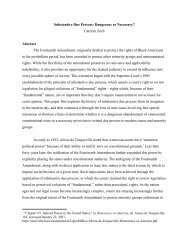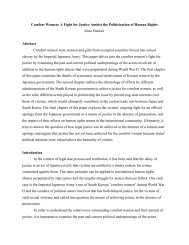Brown Undergraduate Law Review — Vol. 2 No. 2 (Spring 2021)
We are proud to present the Spring 2021 issue of the Brown Undergraduate Law Review. We hope that the works contained herein offer insight and inspiration to all who read them.
We are proud to present the Spring 2021 issue of the Brown Undergraduate Law Review. We hope that the works contained herein offer insight and inspiration to all who read them.
You also want an ePaper? Increase the reach of your titles
YUMPU automatically turns print PDFs into web optimized ePapers that Google loves.
The Failure of the Treatment of Low-Level Offenders in the Juvenile Justice System<br />
may be grounds for concern that the child receives the<br />
worst of both worlds: that he gets neither the protections<br />
accorded to adults nor the solicitous care and regenerative<br />
treatment postulated for children.? 94 The children in the<br />
juvenile justice system are exposed to the worst of both<br />
worlds, and will continue to be harmed in this system until<br />
low-level offenses are removed from the jurisdiction of<br />
these ?kangaroo courts?altogether, and placed instead into<br />
the care of the community.<br />
strategies that effectively rehabilitate status offenders,<br />
instead of involving a court system that is proven to<br />
increase future criminality. Community-based programs,<br />
that center the family and provide group therapy, have<br />
consistently improved outcomes for juveniles, both<br />
empirically and in observed changes. These methods are<br />
also cost-effective for the state and follow the founding<br />
principle of juvenile justice: rehabilitation.<br />
While more procedural protections, zealous attorney<br />
Conclusion<br />
advocacy for children, and rehabilitative-minded<br />
approaches can incrementally fix problems in the juvenile<br />
In <strong>No</strong>vember 2020, 50 prosecutors and 90 current and<br />
justice system, these solutions can not override the<br />
former probation officers issued a joint statement with the<br />
discriminatory and punitive founding of the juvenile<br />
organization EXiT (Executives Transforming Probation<br />
justice system. Children who have been stripped of their<br />
and Parole) calling to end incarceration for technical<br />
liberty do not feel rehabilitated. Justice Fortas feared<br />
probation violations, downsize probation, and make<br />
supervision more individualized and goal-orientated.? 95 children were receiving the ?worst of both worlds? within<br />
the juvenile justice system, and more than 50 years later,<br />
Even those most intimately involved in this surveillance<br />
his warning still rings true.<br />
system, prosecutors and probation officers, recognize that<br />
this two billion dollar system has gone too far. While a<br />
step in the right direction, reforms in the juvenile justice<br />
system have not fixed a system broken from inception. The<br />
failure of the juvenile justice system reaches farther<br />
beyond an overzealous probation system and the<br />
incarceration of low-level offenses for crimes better<br />
handled by community rehabilitation. The largest failure of<br />
the juvenile justice system is its systemic robbing of liberty<br />
from children. Instead of protection and benevolent<br />
rehabilitation, children are robbed of their liberty and due<br />
process in the name of control and punishment.<br />
Through state statute, the jurisdiction over status offenders<br />
can be removed from juvenile or family courts and placed<br />
in social services. By ending juvenile jurisdiction over<br />
status offenders, officials will be forced to reexamine<br />
social services, community interventions and other<br />
programs that play a role in the rehabilitation of these<br />
youth. This can encourage investment in community-based<br />
94. Kent v. United States, 383 U.S. 556, (1966).<br />
95. Miriam A. Krinsky and Vincent Schiraldi, ?Community supervision, once intended to help offenders, contributes more to mass incarceration,?<br />
USA Today, <strong>No</strong>vember 19, 2020.<br />
<strong>Brown</strong> <strong>Undergraduate</strong> <strong>Law</strong> <strong>Review</strong><br />
20










